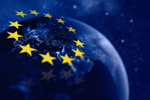Enlightening Sessions & Round Tables
The heart of the conference lay in its informative sessions and panel discussions, each providing a deep dive into critical topics within the realm of technology law. The wealth of knowledge and insights gained from these sessions was invaluable. The sessions covered a myriad of themes, each highly relevant to the evolving landscape of technology law.
DSA
These included discussions on the Digital Services Act (DSA) and its implications beyond major platforms. With the DSA set to take effect next year, the conference explored its relevance in classifying services and delved into its complex criteria application to emerging online services, including AI-based systems like ChatGPT.
Cybersecurity and AI
Another key topic of discussion was cybersecurity and data localization, and the associated challenges of new European Data-Strategy Laws. The session dissected the intricate relationship between industrial and personal data, data access rights, and the protection of intellectual property. Real-life case studies were used to highlight the complexities in defining industrial data and the potential impact on cybersecurity due to data localization. The AI Act and its regulatory journey within the EU was also a central theme. The discussion focused on key pending topics in the legislative process, such as the regulation of generative AI, governance of AI policymaking, the ban on certain AI systems, and the classification of high-risk AI systems.
The conference didn't stop at regulatory matters; it also explored the implications of AI tools and their liability. With separate proposals advancing to deal with liability originating from AI usage, discussions delved into the Product Liability Directive amendment, which creates strict liability for AI system producers, and the broader scope of liability claims in tort law. The legal intricacies of data licensing under EU and US copyright laws were also explored. With AI increasingly using artistic creations, discussions focused on the challenges in enforcing rights, implementing collective licensing, and navigating variations in copyright regulations across EU Member States.
Algorithm fairness & Cybersecurity
Fairness in the algorithmic era was another significant topic. While machine learning models offer significant advantages, their adoption raises concerns about privacy and fairness. The session focused on how controllers can adhere to fairness principles while using machine learning models and addressed the challenges of algorithmic bias at various stages of development and deployment.
Cyber resilience under the NIS2 Directive was a topic of utmost importance, given the evolving landscape of cyber threats. The session highlighted the significance of preparedness and resilience in reducing risks to businesses and society. Industry experts provided insights into practical strategies and approaches for businesses and discussed the challenges associated with NIS2 requirements when operating in the EU.
In addition to the enriching sessions, some of our experts played an active role in facilitating round tables, focusing on various crucial topics. These discussions covered:
- Data protection mass claims
- The pan-European regulatory framework for Blockchain and DLT applications,
- Regulatory barriers to trade and investment in the services sector (FDI), and;
- The future of e-Privacy regulations.
These round table sessions allowed for a deeper exploration of these subjects, providing valuable insights into the practices and legal perspectives in different jurisdictions.
The ITechLaw Conference 2023 was a resounding success, offering attendees an opportunity to explore the ever-changing landscape of technology law. As we left the conference with a treasure trove of knowledge and connections, it was clear that the legal world and the tech industry are on an exciting trajectory. With regulatory challenges, ethical dilemmas, and innovative solutions on the horizon, we eagerly anticipate the developments that lie ahead.
Are you interested in the impact of the ever-changing landscape of technology law on your business?
At Loyens & Loeff, we have a dedicated and multi-disciplinary Digital Economy team with experts combining digital technology know how with in-depth knowledge of the most recent legal and tax developments in the European Union. In addition, we have excellent working relationships with other leading independent law firms and tax consultants in different jurisdictions, guaranteeing you global top-level advice. Please reach out to one of our contact persons for more information.












